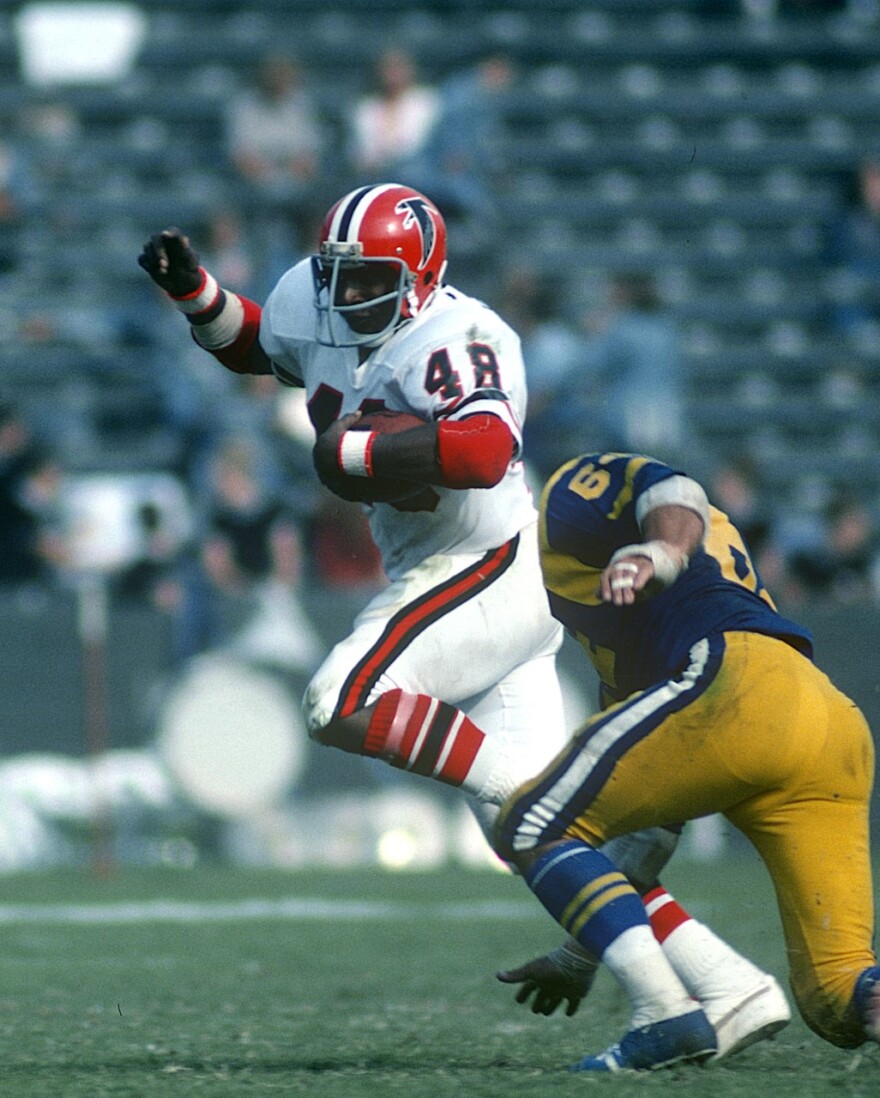Clayton Trutor, a historian of American Cities, has always loved history and sports. His two passions come out in his new book "Loserville: How Professional Sports Remade Atlanta and How Atlanta Remade Professional Sports".
Trutor joined WBGO Studios podcast SportsJam with Doug Doyle to talk about the book that explains how Atlanta went from a city with no professional sports teams in 1965, to a city that became the home for the Atlanta Braves, Atlanta Falcons, Atlanta Hawks and the NHL's Atlanta Flames by 1972. For most of that seven-year period, those four franchises would struggle financially.
Trutor says hopes his book can be a guide for cities that are currently looking for a professional sports team.
"In many ways Atlanta invents the business model that so many other cities adopt, often times quite explicitly. When Tampa went out and sought out pro sports in the 1970's and '80s, they said they were going to do what Atlanta did, but we're going to do it smarter. Jacksonville very explicitly said so. New Orleans just a year or two after Atlanta starting getting pro sports was doing this themselves as well. So many other cities have found if you make these investments you'll draw the attention of the big leagues. And inadvertently it created an arms race among cities. The more established Major League markets had to end up building their own stadiums to compete with all of these new communities who were willing to join the big leagues. Suddenly after World War II, you have a rapid expansion of the number of cities that have the discretionary income to have pro sports teams, they have enough citizens to have pro sports teams as transportation improves with highways and jets across the country, it makes it much more feasible for the big leagues to expand. It required cities being willing to put themselves out there, saying we're open for business to make this happen. And Atlanta really starts this process for better or worse."

Trutor's "Loserville" (University of Nebraska Press) stresses that having success in other arenas didn't necessarily translate into successful sports executives, and thus Atlanta's early franchises were disappointments.
"Just because you ran a successful manufacturing firm or you were great at selling insurance or running a bank, didn't mean you knew how to run a football team. And that certainly showed in Atlanta in its early years. You had a novice bunch of owners or absentee owners for all of their teams and they often relied on their close associates rather than experts in their sports to succeed. I think that is one of the big lessons from the book. Atlanta's teams have done much better in recent decades because the owners have turned it over to people who are experts in their field, just like they would with any other business. Looking back, there may be a tendency to be a little tough on them because there really hadn't been a generation of expansion owners before. There really wasn't much previous experience to look at."
Trutor says one of the saviors of professional sports in Atlanta was Ted Turner, the business and television executive who eventually became an owner of Atlanta teams.

"Pro sports, to a great extent, might have left Atlanta if it wasn't for Ted Turner's efforts in the mid 1970's. The station which evolved into TBS, Ted Turner started broadcasting sports out of in 1973, it was a small UHF station called WTCG. They started covering Braves games. They started covering Hawks games. He eventually becomes the owner of both the Braves and Hawks in a relatively short period of time. In January '76 he buys the Braves on the installment plan. The existing owners who were basically the sons of wealthy Chicago industrialists were looking for a new home for the club. There was talk of Seattle, there was talk of Toronto there was talk of splitting games between the new SuperDome in New Orleans and Atlanta."
Trutor, who holds a PhD in U.S. history from Boston College and teaches at Norwich University in Northfield, Vermont, says that's when Turner made what eventually turned out to be a huge business deal that would keep two teams in Atlanta.
"Ted Turner steps up and buys the team for $10-million, one million dollars for ten years. It serves as vary inexpensive programming for TBS moving forward alongside re-runs of "Andy of Mayberry" and Happy Days" and all kinds of other rerun-type programming. He also buys the Hawks in '77 from Tom Cousins who was a major real estate investor city who was starting to see some of his downtown investments go sideways. He gets out from under the Hawks and the Atlanta Flames hockey team whom he owned. He sold them (Flames) to some businessmen in Calgary, Alberta. But it's Ted Turner who saves two of Atlanta's franchises, suffers through a number of years of losing money on these teams. They're providing programming for his TV station but they're not drawing well in the stands. Initially, he had the problem the previous owners did that he relied to a great extent on guys in his organization to play prominent roles. But the more he turned things over to the experts in both sports, the better both franchises did, in particular the Braves, once they hired John Schuerholz as General Manager, they developed one of the best minor league systems in baseball and have really been as successful as any organization in baseball for the past three decades."
Trutor got the title of the book from a newspaper series in the mi-70's. In July 1975, the editors of the Atlanta Constitution ran a two-part series entitled “Loserville, U.S.A.” The provocatively titled series detailed the futility of Atlanta’s four professional sports teams in the decade following the 1966 arrival of its first two major league franchises, Major League Baseball’s Atlanta Braves and the National Football League’s Atlanta Falcons. Two years later, the Atlanta Hawks of the National Basketball Association became the city’s third major professional sports franchise. In 1972 the National Hockey League granted the Flames expansion franchise to the city, making Atlanta the first southern city with teams in all four of the big leagues.
Hard to believe the Braves and Hawks would struggle getting fans in the seats during the runs of two of the greatest sports legends of all-time, baseball's Henry "Hammerin' Hank" Aaron and the basketball's "Pistol" Maravich.

"On two occasions Atlanta was the best-drawing road team in the National League. They went to St. Louis, they went to Cincinnati, they went to New York, they went to Los Angeles, full houses gave Hank Aaron a standing ovation every time he came to bat. He'd come back to Atlanta to play in front of a few thousand people. Pete Maravich faced the same thing in the NBA in relatively the same time period. People around the country who had heard about "Pistol" Pete playing at LSU finally got to see him in arenas in New York, LA and Chicago and everywhere else. In Atlanta, they were just drawing three or four thousand people a game frequently, in spite of both instances, playing basically in brand new stadiums that were state-of-the-art at the time."

What was the problem?
"So in many ways, it's very confusing what happened. There's a lot of reasons for it. In part it's because you ha a lot of transplants from other parts of the country who didn't feel any particular loyalty to Atlanta's teams themselves. If they were sports fans they retained loyalties to the cities from where they came. You certainly have the issue of being such a spread out and suburban place. Atlantans, it was figured out in a couple of occasions during the early 2000's, draw more than anybody else on the planet on average with their commutes. So coming back into the city for a game was often a chore for people. They were plenty of people who could simply not afford to attend games and locals certainly had existing sporting passions before the big leagues got to town."
The Atlanta Falcons nearly won Super Bowl 51, but blew a 28-3 third quarter lead to Tom Brady and the New England Patriots, but the early days for the Falcons was not an enjoyable one for the fans. They only had a winning record in 4 of their first 15 seasons. Trutor says an eventual change in the city's approach really helped the Falcons and other Atlanta franchises.

"The support these teams have received, particularly from African American fans since that broad expansion of Atlanta's black middle class, I think in many ways have helped stabilize Atlanta as a sporting market that had been very dependent on the whims of suburban consumers who lived very far from the stadiums. I think the Falcons would have roughly the same support they have now whether or not they had won that Super Bowl. I think things are pretty steady in that operation. I think Arthur Blank is a pretty strong owner."
During a decade-long worth of research for "Loserville", the historian says he was surprised at how well the Flames did during their time in Atlanta, making the playoffs in all but two NHL seasons. He also says many people aren't aware of the popularity of the Atlanta United soccer team of the MLS, filling up Mercedes-Benz Stadium and has won a championship.
"Loserville, the title is in no way a commentary on Atlanta's present. It's a very successful sports city. It was really aimed at setting the sense of time and place for the majority of the book which is in the 60's and 70's."

Clayton Trutor says his love of history came from spending time with his grandmother.
"I had a grandma who in her hometown ran the town's museum. From that time onward, age 4 o 5 when I became aware of it, I was interested in history. For family vacations, I had a grandfather who was buried in Arlington, we'd stop at that, we'd stop at Gettysburg, we'd stop at Fredericksburg, so I was interested in. The Civil War was probably the first thing I was interested in historically. I later on became a sports fan. It wasn't really until graduate school that I got the idea to combine the two."
Trutor is also the Vermont state chairman of the Society for American Baseball Research (SABR) and is a regular contributor to the SABR Biography Project.
You can SEE the entire SportsJam with Doug Doyle interview with Clayton Trutor here.




